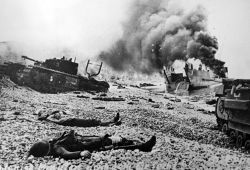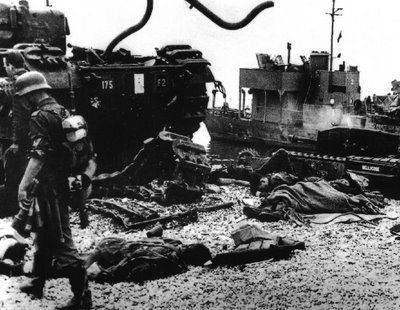
Publisher:
Bonnie King
CONTACT:
Newsroom@Salem-news.com
Advertising:
Adsales@Salem-news.com

~Truth~
~Justice~
~Peace~
TJP
Jul-11-2013 15:33


 TweetFollow @OregonNews
TweetFollow @OregonNews
Dieppe: The Grand Delusion
Bill Annett Salem-News.comIt would be many years before I fully understood the total and useless disaster of Dieppe.
 Dieppe - 1942 courtesy: historylearningsite.co.uk |
(DAYTONA BEACH, FL) - Perhaps the only people who really love war are 12-year-old boys and a few other 12-year-old minds, such as those of arms manufacturers, dictators and right-wing politicians who don't have to go there.
 Courtesy: miniarmour.net |
I was a 12-year-old boy in 1942. Model Spitfires, ME-109s and Curtis P-40s hung from the ceiling of my room, I charted daily the deployment of Von Paulus' panzers on the Russian Front. I could tell you exactly the maneuvers that sank the Scharnhorst in the North Sea and the Graf Spee in Montevideo Harbor, and I kept score every day of the kill ratio of the Luftwaffe during the Battle of Britain.
Meanwhile, my mother made do with war-time recipes, my father was a sergeant in a reserve unit of the Calgary Tank Regiment, (which drilled twice a week on our local school's baseball diamond) my oldest brother was at Royal Roads Naval Academy, our Model A Ford was up on blocks for want of tires and gas rationing, and I'd forgotten what a chocolate bar tasted like, other than the ersatz wartime variety with the flavor of soap. In other words, my family was on a full wartime footing, and I was its amanuensis.
 Courtesy: ww2throughthelens.blogspot.com |
And then one day in August, all of us on the home front were cheered with the news about Dieppe, a small French coastal town occupied by the Germans, of course, and which was the scene of a daring, heroic commando-type strike involving elements of the Second Canadian Division and the First Canadian Armored Brigade. At last we were really in the war, and out of our 6,000 troops committed, almost 1,000 were killed in a single day.
Two years before D-Day, it was the first engagement in Europe for our troops, (who had been training in England since 1940, leave taking in London and Brighton and no doubt doing their utmost to augment England's next census.)
We were told by breathless foreign correspondents, as well as old Winnie himself, that much invaluable information had been gained by the Dieppe Raid, which would be of later benefit in the Normandy invasion.
For the edification and sustenance of the patriotic folks back home - including this 12-year-old boy - the Victoria Cross, the most distinguished decoration for valor in the Commonwealth, had been awarded to Captain John Foote, a chaplain with the Royal Hamilton Light Infantry, and Lt. Col. Cecil Merritt of the South Saskatchewan Regiment. Merritt had lead an assault on a bridge above the town under withering fire and later helped ensure the evacuation of troops from the beach before being captured himself. Foote continually exposed himself to enemy fire while aiding wounded soldiers, and then elected to remain behind with wounded Canadian prisoners of war rather than be evacuated himself. If you're documenting war, and the heroism of war, you can't do much better than that.
It would be many years before I fully understood the total and useless disaster of Dieppe.
In 1942, in spite of Churchill's speeches and Roosevelt's studied support, now legitimized by Pearl Harbor, the Allies were in pretty bad shape on all fronts. In the Pacific, the Battle of the Coral Sea had proven that the Japanese could be overcome, but that was still a long way from happening. In North Africa, Rommel's Afrika Corps was closer to Cairo than it was to Tobruk. Meanwhile, the Russian Front was rapidly crumbling along the scorched-earth road to Stalingrad.
Everybody on the Allied side needed some good news.
Any invasion of Europe was two years premature, but a reasonable case could be made, on the part of the U.S. High Command and even by Churchill, for a limited tactical foray against Fortress Europe. That is, it could have been, provided it was well-planned as to location and objective, with strong naval support and total air supremacy. Malheureusement, none of those three elements were in place with the Dieppe raid.
The original planning was for a British "jolly good show," involving Bernard Montgomery, still only a lieutenant general, but commanding Commonwealth forces in the south of England. Monty was handed the project under the overall purview of Admiral Lord Louis Mountbatten, a supreme wartime British icon whose dearth of naval or military experience was offset by the fact that he was the future-uncle-in-law of the heir apparent (then a young teen-age girl) but right in line to be Queen of England and all the colonies gradually morphing into commonwealth status beyond the seas (including the one known as Canada, from the aboriginal "Kanata," meaning roughly "our town.")
Montgomery, whom Hemingway famously described as reluctant to move without odds of three to one in his favor, apparently didn't allow such military necessities to cloud his judgment where colonial troops were concerned. In this and other instances, the British military upper crust had considered the volunteers from the colonies just as inferior and expendable as had Cornwallis in his view of the American militia that systematically whipped his imperial assiette 175 years earlier.
So given the option to choose the lucky troops for the Dieppe raid, Monty fingered the Canadians. (Later, after Normandy, serving under his command, Crerar's Canadian First Army liberated Holland and a chunk of Belgium, while Monty was dreaming up other loss-heavy bridges-too-far such as Operation Market Garden, and complaining to Omar Bradley that Patton to the south was moving too fast.)
Following the initial actual boarding of transports, the raid was delayed and dismounted at least once and, with the troops' return to camp and the inevitable pub gossip along most of southern England, the Dieppe Raid became about as well-kept a secret as the two badges on Monty's beret. If there was a single German spy in Blighty who didn't know about the imminent raid, he was either vacationing in Scotland or on a week-long drunk.
Meanwhile, although no serious thought was given to standing down, a few features were deleted from the original plan, once again by the Colonel Blimp types in the British High Command. There remained the careful selection of the port of Dieppe - whch was conveniently surrounded by high cliffs, enabling the well-entrenched and concentrated German field guns and machine guns to pour their deadly fire on the beach. The beach itself was a rough sloping tidewater made up of fist-sized rocks that were ideal for bogging down the tanks and Bren-gun carriers that sloshed ashore. The air cover by the RAF and RCAF that had been a crucial pre-requisite from the beginning were cancelled for reasons unknown, while the Royal Navy's planned offshore belting of the town with a warm-up salvo also didn't happen. If Mountbatten and Monty had set out to design a guaranteed colossal failure, they could not have done so with more accuracy. Even a parachute drop scheduled on both sides of the town, flanking the beach was cancelled, being replaced by a sea-borne commando effort that bogged down early with no apparent effect in aid of the main landing force. The main force bogged down early and was routed by mid-morning.
To cap it all and ensure failure, the landing force while still seaborne encountered a German convoy some distance off the coast and the resulting gunfire told the Germans in the town all they needed to know in order to provide a welcoming party.
Ross Munro, the famous Canadian war correspondent, who was embedded with the Second Div, wrote about the resulting catastrophe: "The Germans held a couple of houses and some strong pillboxes near the top of the cliff, and were able to pour fire into the boats... the ramps were lowered, but German fire caught those who tried to make it." The survivors on the beach surrendered by early morning. A few on higher ground held out until the afternoon.
J. L. Granatstein, writing in Legion Magazine recently, summed it up as follows: "The initial press reports in Canada proclaimed a great victory... but when the endless lists of killed and wounded began to be published in Canada, the shock was terrific. In Britain, Mountbatten immediately began to talk about the great lessons learned... The public relations plan prepared in advance by Mountbatten's staff had called for just such a response."
In fact, in Winston Churchill's monumental history of the war years, Mountbatten was permitted to rewrite the British wartime leader's description of the Dieppe raid, rendering it almost completely self-serving.
"Mountbatten," Granatstein concluded, "was promoted and dispatched to South East Asia as Supreme Commander. Montgomery went to El Alamein to find his destiny... The war went on. Only the vicious, unhealed scar of Dieppe remained - that and the rows of grave markers in The Dieppe Canadian War Cemetery."
And 72 years later, a 12-year-old boy had finally grown up. Because Churchill, and not Mountbatten, had had the last word:
"In the sombre wars of modern democracy, there is little room for chivalry."
center;">______________________________________________________

Bill Annett grew up a writing brat; his father, Ross Annett, at a time when Scott Fitzgerald and P.G. Wodehouse were regular contributors, wrote the longest series of short stories in the Saturday Evening Post's history, with the sole exception of the unsinkable Tugboat Annie.
At 18, Bill's first short story was included in the anthology “Canadian Short Stories.” Alarmed, his father enrolled Bill in law school in Manitoba to ensure his going straight. For a time, it worked, although Bill did an arabesque into an English major, followed, logically, by corporation finance, investment banking and business administration at NYU and the Wharton School. He added G.I. education in the Army's CID at Fort Dix, New Jersey during the Korean altercation.
He also contributed to The American Banker and Venture in New York, INC. in Boston, the International Mining Journal in London, Hong Kong Business, Financial Times and Financial Post in Toronto.
Bill has written six books, including a page-turner on mutual funds, a send-up on the securities industry, three corporate histories and a novel, the latter no doubt inspired by his current occupation in Daytona Beach as a law-abiding beach comber.
You can write to Bill Annett at this address: bilko23@gmail.com
 |
 |
 |
Articles for July 10, 2013 | Articles for July 11, 2013 | Articles for July 12, 2013


Quick Links
DINING
Willamette UniversityGoudy Commons Cafe
Dine on the Queen
Willamette Queen Sternwheeler
MUST SEE SALEM
Oregon Capitol ToursCapitol History Gateway
Willamette River Ride
Willamette Queen Sternwheeler
Historic Home Tours:
Deepwood Museum
The Bush House
Gaiety Hollow Garden
AUCTIONS - APPRAISALS
Auction Masters & AppraisalsCONSTRUCTION SERVICES
Roofing and ContractingSheridan, Ore.
ONLINE SHOPPING
Special Occasion DressesAdvertise with Salem-News
Contact:AdSales@Salem-News.com

googlec507860f6901db00.html

Terms of Service | Privacy Policy
All comments and messages are approved by people and self promotional links or unacceptable comments are denied.
[Return to Top]
©2026 Salem-News.com. All opinions expressed in this article are those of the author and do not necessarily reflect those of Salem-News.com.